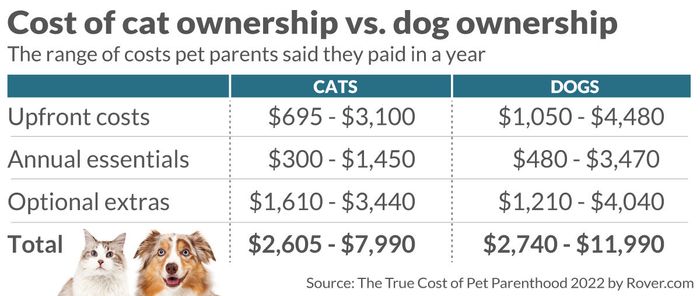Hello and welcome to Financial Face-off, a MarketWatch column where we help you weigh financial decisions. Our columnist will give her verdict. Weigh in on whether you think she’s right in the comments. And please share your suggestions for future Financial Face-off columns.
The face-off
If you’re not already a pet owner, headlines about pandemic pets may have you pondering pet parenthood. Some people strongly identify as either a cat or dog person, but others feel more flexible about their animal allegiances. If you’re on the fence about Fluffy vs. Fido, pull up a chair.
Why it matters
People often overlook the full financial consequences of adding a pet to their household, said Dr. Rebecca Greenstein, Veterinary Medical Advisor for Rover ROVR, -0.52%, a platform for booking pet care. Some 38% of new dog owners expected to pay $500 or less to bring home a dog, but the up-front costs actually ranged from $1,050 to $4,480 on average, according to a survey of pet owners by Rover. These guidelines from the American Veterinary Medical Association will give you an idea of what responsible pet ownership entails.
“When we’re contemplating bringing a pet into our lives we need to make sure we are ready for the commitment, and it’s a commitment that can last into decades,” Greenstein said. Emergencies happen, and they’re even more stressful when you’re looking at a big vet bill as a result. A lot of dog owners don’t know that fixing a broken leg can run between $3,000 to $6,000, Greenstein said. (If you find yourself having trouble affording a pet, the Humane Society has tips about financial aid.)
On a simple math level, the start-up and month-to-month costs of owning a cat are generally lower than owning a dog. But keep in mind these costs vary a lot depending on the size and health of the animal and your lifestyle.
Cat owners said their first-time costs ranged from $695 to $3,100, including adoption fees, toys, litter box, and other equipment, according to the Rover survey, while dog owners paid first-time costs ranging from $1,050 to $4,480.
Annual essentials such as food and a vet check-up ran cat owners from $300 to $1,450 per year; dog owners paid $480 to $3,470. Optional expenses like grooming and pet insurance can top out at $3,440 for felines and $4,040 for dogs.

Cats tend to be cheaper because they’re smaller animals and don’t need as much food. Most dogs require walking and boarding when you’re away, whereas cats are more self-sufficient. They also typically live indoors and may not encounter the mishaps that can befall canines when they’re out in the world.
There’s a caveat though. Cats tend to live longer than dogs, so the costs could even out over the life of the pet, depending on the breed. Indoor cats can live up to 20 years, while some larger dogs like Great Danes are considered elderly at 8, Greenstein said.
However, like most money-related decisions, this one goes beyond dollars and sense. “It’s like having a child — financially it doesn’t make sense at all,” Greenstein said. “The intangibles drive the decision.”
For many people, it comes down to a factor we can’t put a price on: love. “The human-animal bond is one of the strongest bonds out there,” said Teresa Keiger, creative director and all-breed judge at The Cat Fanciers Association. “These are animals that give us absolute unconditional love. They don’t care what we look like, they don’t care what happened to us today. They want to be there for you and want you to be there for them.”
The verdict
By a whisker, my verdict is to get a dog.
My reasons
Cats are wonderful creatures, and so are their owners (she wrote, desperately pandering to the cat crowd). But the return on investment on a dog feels slightly more robust. Owning a dog forces you to do three activities generally believed to be good for humans: going outside, where you may experience brain-healing “soft fascination”; exercising, by walking your mutt; and interacting with people in your neighborhood. Even if it’s just a nod to another dog owner at the park, research suggests that “weak social ties” can improve happiness.
At a time when nearly half of Americans say the pandemic has divided their communities and our democracy is fractured to the point of breaking, owning a pet that creates opportunities to socialize feels like a positive step for your own mental health and — at the risk of sounding grandiose — for the good of the country as a whole. So, for your health, for your country, invest in a dog. If you want to save money, go with a rescue and get a smaller breed. A smaller pup won’t require as much food and can travel with you so you don’t have to pay for a kennel.
“The joy of owning a dog for many many years, day in and day out, is well worth the cost, especially given what we’ve been through over the past couple of years,” said Brandi Hunter Munden, vice president of public relations and communications at the American Kennel Club. “It’s one of those things I tell people all the time: I’m grateful for therapy and dogs.”
Is my decision best for you?
The fringe benefits of dog ownership — going outside, exercising, socializing — are just icing on the cake. If all you’re looking for in a pet is simple companionship, then cats, pound-for-pound, are the most cost-effective choice. A cat is also a good option if you live in housing where dogs aren’t allowed, have limited outdoor space or limited mobility. Cats provide “unconditional love and hours of snuggles,” Keiger said. “You’ll be endlessly entertained by their antics, and relax to the sound of their purring,” she said, adding that a cat’s purr may have healing powers for both cats and humans.
Tell me what you think of my verdict in the comments, and send in your questions for future Financial Face-offs.
See also: Financial Face-off: Leasing a car vs. buying a car — how to decide










